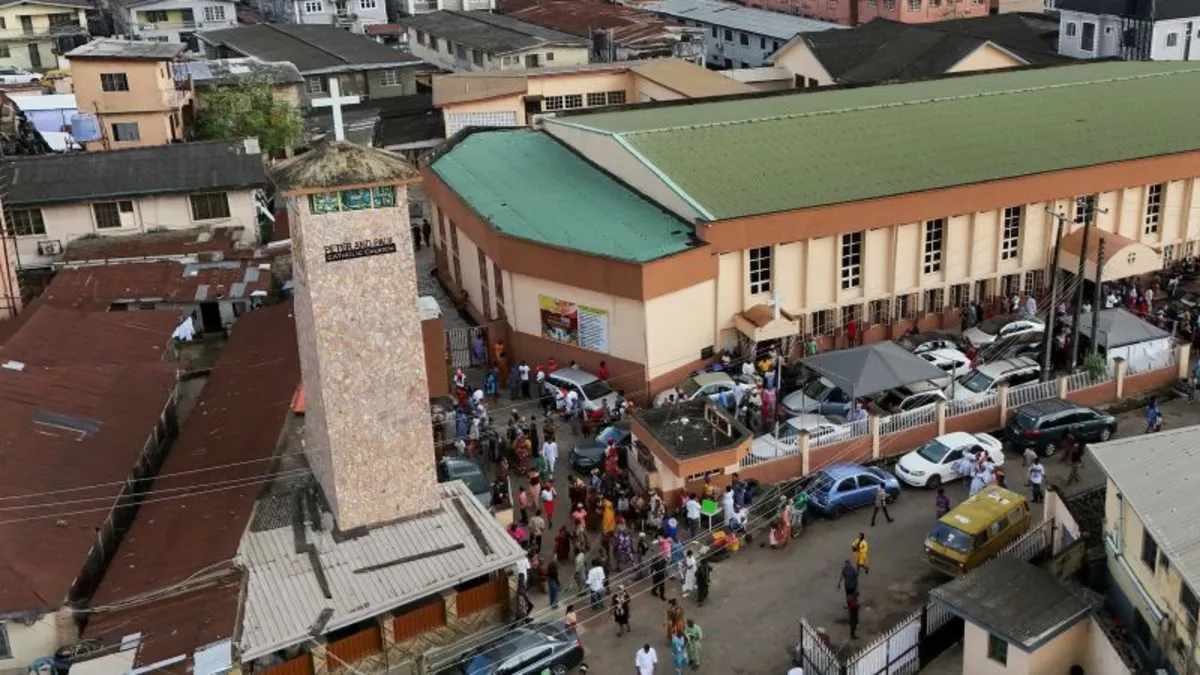
On Friday, President Donald Trump was en route to Florida when he came across a report on Fox News highlighting the alarming situation faced by Christians targeted by Islamic groups in Nigeria. Sources close to the matter revealed to CNN that Trump was “immediately” angered by the news and requested more information regarding the crisis.
After Air Force One landed in West Palm Beach, Trump took to Truth Social to voice his concerns. He stated, “Christianity is facing an existential threat in Nigeria. Thousands of Christians are being killed. Radical Islamists are responsible for this mass slaughter.” He announced his intention to classify Nigeria as a “Country of Particular Concern” under the International Religious Freedom Act.
A White House official confirmed to CNN that Trump had been monitoring the situation and had already been contemplating how to address it publicly. The plight of Christians in Nigeria quickly became a central focus for Trump over the weekend, leading him to urge his Secretary of Defense to “prepare for possible action,” warning that the U.S. might enter Nigeria “guns-a-blazing” to protect its Christian population.
According to one source familiar with Trump's thought process, the president's threats were intended to provoke a reaction from Nigeria. “It’s an ‘Art of the Deal’-type strategy,” the source explained, emphasizing that the attention garnered by Trump's posts was an intended outcome. White House spokesperson Anna Kelly stated, “At President Trump’s direction, the Department of War is planning options for possible action to stop the killing of Christians in Nigeria.” She added that any formal announcements would be made directly by the President.
The situation concerning Nigeria’s Christians has long been a pressing topic for American conservatives. Prominent allies of Trump, such as Sen. Ted Cruz, have recently called for U.S. intervention, arguing that Nigeria's government has failed to protect Christians from ongoing attacks. However, Nigeria has denied these claims, asserting that both Christians and Muslims have been victims of violence perpetrated by radical Islamists.
Trump's directive to the Pentagon to prepare for possible military action—potentially involving U.S. troops on the ground—took many by surprise, including military officials. As a result of Trump’s Saturday post, personnel within U.S. Africa Command (AFRICOM) were recalled to headquarters to discuss potential courses of action. Defense Secretary Pete Hegseth confirmed that the Pentagon was “preparing for action,” while there were indications that various contingency plans were being developed.
Sean Parnell, chief Pentagon spokesperson, remarked, “President Trump was elected in a landslide victory to accomplish his peace through strength agenda. The Department of War stands ready to execute the Commander in Chief’s direction.” However, the rapid response highlighted frustrations within the military regarding the way policy decisions were communicated through social media.
While Trump described a “mass slaughter” of Christians occurring in Nigeria, the situation is more complex. Experts note that both Christians and Muslims face threats from radical Islamist groups in a nation of over 230 million people. The ongoing violence stems not only from religious motivations but also from communal tensions and disputes over resources. Massad Boulos, an adviser on Arab and African affairs, acknowledged that groups like Boko Haram and ISIS have killed more Muslims than Christians in Nigeria.
The Nigerian government expressed its shock at Trump’s suggestion of military intervention, with presidential spokesperson Bayo Onanuga stating, “We are shocked that President Trump is mulling an invasion of our country.” Despite the Nigerian government's denial of inadequate protection for Christians, alarm has grown among American conservatives regarding the situation.
Trump's renewed focus on Nigeria aligns with a broader conservative effort to pressure the Nigerian government on religious violence. Having garnered significant support from evangelical Christians, Trump vowed during his previous election campaign to combat anti-Christian bias. Paula White-Cain, a senior adviser and longtime spiritual confidante to Trump, expressed gratitude for his strong stance against Christian persecution in Nigeria.
Sen. Ted Cruz is among the lawmakers advocating for Nigeria to be designated as a violator of religious freedoms. In September, he introduced a bill aimed at sanctioning Nigerian officials accused of facilitating violence against Christians. This legislative push coincided with Trump’s classification of Nigeria as a “Country of Particular Concern,” which the Biden administration subsequently reversed.
As Trump continues to draw attention to the plight of Christians in Nigeria, the prospect of U.S. military intervention remains uncertain. Last year, the U.S. withdrew approximately 1,000 troops from neighboring Niger, marking an end to a long-standing military presence in the region. The implications of potential U.S. action in Nigeria will depend on how the situation evolves and how the Nigerian government responds to international pressure.
This article will be updated with further developments as the situation unfolds. CNN’s Nimi Princewill contributed to this report.